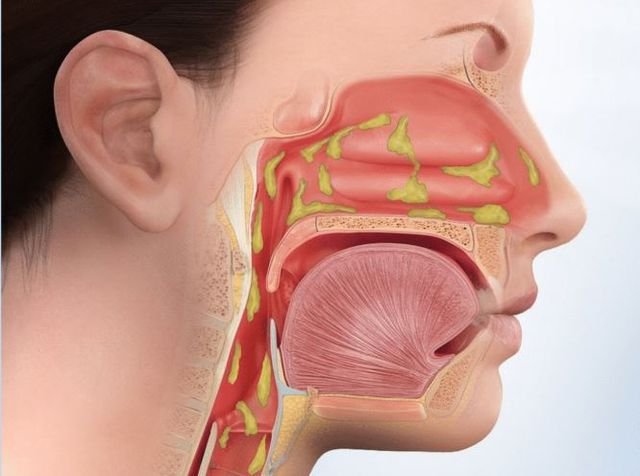How Postnasal drip affects your Voice
When people think of allergies, they think of the typical symptoms depicted in commercials: itchy, watery eyes; a runny nose; and sneezing. However, allergies may show up with subtle symptoms like mild nasal congestion. For professional voice users, the most problematic concern is the effect on the voice: postnasal drip.
What is a postnasal drip?
Postnasal drip is the mucus that runs down the back of the throat from the nose.
Mucus is produced throughout the nose, throat, and respiratory tract, with a significant portion generated in the nose and sinuses. The body produces around 1-1.5 liters of mucus per day, and much of it flows down the back of the nose into the throat, where it is swallowed.
Postnasal drip occurs when the amount of type of nasal mucus changes, becoming noticeable (rather than just being swallowed). For instance, during a cold, mucus production increases, and it becomes thicker. As this thicker mucus drips down the back of the throat, it is sensed as a postnasal drip.
Do allergies cause postnasal drip?
During an allergic flare, such as when pollen blooms, more mucus is produced by the nose, and the mucus is more inflammatory and irritating. This explains why allergy sufferers often wake up with a sore throat in the morning, as they have been lying down throughout the night, allowing the allergic and irritating mucus to drip into their throat, leading to discomfort.
How does this impact the voice?
Postnasal drip affects the voice in two ways:
Laryngitis – Postnasal drip causes irritating mucus to come into contact with the vocal folds, especially during sleep. This can result in vocal fold swelling, leading to symptoms ranging from severe (such as hoarseness and reduced vocal range) to subtle (like delayed onset of voice or prolonged warm-up time). Over time, this can heighten the risk of injury and potentially become permanent.
Reduced nasal resonance – Chronic allergies can inflame nasal structures known as turbinates (more on these below). Turbinate inflammation reduces nasal airflow and diminishes the resonance chamber for sound. Consequently, this can make the voice sound congested and less resonant. If left untreated, this condition may become irreversible and necessitate surgery.
What are nasal turbinates?
Turbinates are elongated, tube-like structures extending from the front to the back of the nose. .
They serve as nasal humidifiers, improving the environmental air by warming, moisturizing, and filtering it before it reaches the lungs.
Turbinates act as the body's initial defense against viruses and allergies by trapping these particles in mucus on the turbinates. However, allergies can cause turbinates to swell, resulting in nasal congestion, increased mucus production, and diminished nasal resonance.
How can I treat postnasal drip?
Blowing your nose can provide some relief by reducing mucus production, but this is typically effective only during the day and for a small amount of mucus. For allergic laryngitis, the most effective solutions include:
- Sinus Rinse: A nasal irrigation system is excellent at flushing out allergens and reducing inflammation if recommended by your physician.
- Prescription nasal spray: Certain medicated nasal sprays can effectively alleviate allergic inflammation without causing laryngitis, a common side effect of many nasal sprays.
- Allergy management: Allergy desensitization is an effective method to decrease the severity of allergies and possibly eliminate the need for medication
- Turbinate reduction surgery: In cases of chronic, unresponsive turbinate swelling, turbinate reduction surgery can enhance nasal airflow, diminish postnasal drip, and reduce the frequency of infections. However, it's crucial to collaborate with a surgeon experienced in the vocal outcomes of nasal surgery and partner with a laryngologist.
Interested in working with the best professionals in LA for voice care and rehabilitation?
Meet Dr. Gupta, the top voice doctor in LA, and Tressa Cox, the leading voice therapist specializing in voice rehabilitation.
Learn more about their expertise and services at the Center for Vocal Health.



